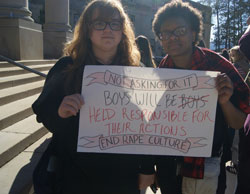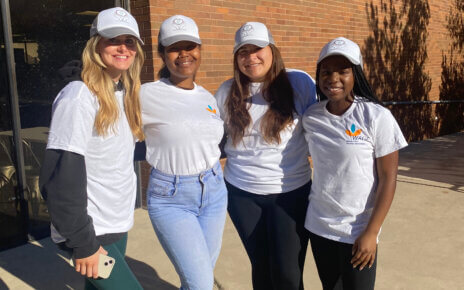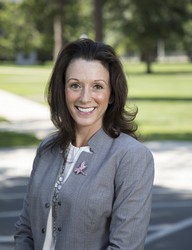Over 50 students, faculty, administrators, and other members of the University community participated in a demonstration on International Women’s Day on March 8. The program began with a march from the Monmouth University Guggenheim Library to a rally at Wilson Hall, and ended with a movie screening of “She’s Beautiful When She’s Angry” in Pozycki auditorium.
“Women have come a long way in the ‘march’ towards gender equality. Worldwide, women and men stand in solidarity with each other to achieve equality. Despite great progress made possible by generations that came before us, we still have miles to go,” said Rekha Datta, a professor of political science and sociology.
“Worldwide, one in three women will face sexual violence in their lifetime. Gender pay gap is almost ubiquitous. These are the global causes that international women’s day reminds us about in terms of the work that is still to be done. The day is also a reminder for us to celebrate what has been accomplished by the human community,” Datta continued.
The march was co-sponsored by a number of student clubs and organizations including Students Advocating Girls’ Education (SAGE), the Gender Studies Club, the Sociology Club, Sexuality, Pride, Education, Community, Truth, Respect, and Unity at Monmouth (S.P.E.C.T.R.U.M.), the Social Work Society, and the Muslim Student Association.
Students and supporters alike gathered near the back steps of the library with an array of signs, such as “women equal people,” and “stop policing women’s bodies.” A cameraman from Asbury Park Press interviewed students while they waited for the march to begin.
Janaya Lewinski, President of S.A.G.E. and a senior political science student, said that the march was inspired by similar events held across the country. “Some of the people who helped organize the march, included professors in mental health counseling, an associate dean, professors in political science and sociology, and student leaders like myself who had attended women’s marches following the inauguration of our 45th president,” she commented.
“We all were hungry about what to do next. After attending such a massively inspiring event we all wanted to be able to mobilize ourselves, and the community we belong to,” said Lewinski.
Around 2:50 p.m. the group marched from the library to the steps of Wilson Hall chanting various cries related to ending rape culture and women’s rights.
The rally at Wilson began with opening remarks from Lewinski, and then the spotlight was turned to the crowd, who were invited to speak if they felt comfortable.
Briana Merkerson, a sophomore and music industry student, was the first student to approach the microphone. She sang India Aries song “Video.” “I’m not the average girl from your video. And I ain’t built like a supermodel. But I learned to love myself unconditionally, because I am a queen,” she sang.
Victoria Borges, a senior social work student, carried a sign that stated, “women equal people.’ She said, “Although the symbol and message on the sign was simple the idea is far more complex than what we think. Once people understand that women are people, they will understand that we have voices, we are more than just our bodies, and we are diverse.”
“We should be allowed to speak for ourselves and tell society what is our best method of empowerment, whether it be exposing ourselves or covering up our bodies. Let us speak for ourselves. We are all different so we should talk about our differences and discuss them, and keep fighting, ” said Borges.
Tyler Castro, a sophomore psychology student, was one of a handful of men in attendance at the march. “It is important for men to celebrate International Women’s Day and also be an advocate for change because we are all equal,” he said.
“I feel that many men believe that being a feminist or pro-women is inherently anti-men, which is not true. We all came from women, if it were not for the sacrifices they make every day, none of us would be here. Men have been living the good life for too long, it is time to have women experience the luxuries we receive every day,” Castro continued.
Johanna Foster, an assistant professor of political science and sociology, became involved with the demonstration after attending the March on Washington on Jan. 21. “I know many students and faculty here at MU who attended that march, or the march in New York City, or the local march in Asbury Park that same day and who also wanted to make the point that one march is not going to solve anything, and that the point is to keep marching, and to turn that energy into direct actions to change the policies and actions of the people in power.”
“I encouraged all my students to attend even if they were not sure where they stood on the fights for gender, racial, immigrant, or LGBTQ justice, for example, but to be a part of the process of learning how to make your voice heard and how to mobilize for the changes you want to see in your world,” said Foster.
Lewinski was pleased with the openness of the speakers at the rally. “I was surprised at the depth of the contributions made on the open mic. Some of the speeches made me kind of emotional, and I’m never ready for that,” she said.
According to Datta, the march was a celebration of diversity on campus. “The readings and reflections clearly showed our student leaders at their best. They served as voices for those who need support. They made us proud to be part of the MU community,” she said.
Following the rally, some participants went to the showing of “She’s Beautiful When She’s Angry,” in Pozycki auditorium.
Jane Lai, Vice President of S.P.E.C.T.R.U.M. and a sophomore English student, hopes that students left the series of events feeling hopeful. She said, “As simple as that sounds, sometimes simplicity is what we are blinded to. Sometimes it only takes one tiny thing, whether it be a compliment or just a sign that tells someone, ‘I can do this.’”
PHOTO COURTESY of Kenny Bieber




